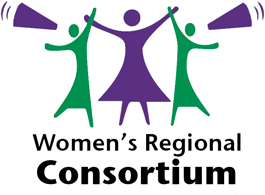At Foyle Women’s Information Network (FWIN), our mission has always been to amplify the voices of women in the North West. In recent months, following violent attacks against women in Derry ~ Londonderry, we were faced with an urgent challenge that required a coordinated and comprehensive response to manage the fear and anger felt by our members. Through the intersection of communications, policy, and engagement, FWIN has been at the forefront of the local movement to tackle violence against women and girls (VAWG). Here’s how our collective efforts came together to make a tangible impact.
Identifying the Crisis: A Call to Action
The series of violent attacks against women in the city left the community shaken and fearful. As messages poured in from our members expressing frustration, fear, and anger, it became clear that immediate action was needed. At FWIN, we recognized that this wasn’t just about responding to individual incidents—it was about addressing the systemic issues that perpetuate violence against women and girls.
Our first step was to ensure women’s voices were heard. Through surveys, focus groups, and one-on-one conversations, we gathered insights and lived experiences from women across the city. We asked women what they needed to feel safe, and be able to walk their own streets with confidence and without fear. These stories and suggestions became the foundation for our advocacy, allowing us to articulate the deep need for action.
Policy Advocacy: Driving Change at a Strategic Level
The insights we gathered shaped a set of ten strategic recommendations, which we presented to Derry City and Strabane District Council during a special council meeting. These recommendations focused on both immediate safety measures—such as improved lighting and checks on rogue taxis—and long-term systemic change, including education initiatives and mental health support.
One key recommendation was for the Council to mobilize and lead a Reclaim the Night March. While the motions were unanimously passed, the organization and execution of the march largely fell to the women’s sector. This reinforced a critical point: while policy decisions are essential, they must be accompanied by dedicated resources and follow-through from institutions. Despite these challenges, the collaborative determination of the community and voluntary sector ensured that the march became a reality.
Communications: Amplifying the Message
Communications played a vital role in ensuring that our efforts reached the wider community. From press releases and radio interviews to social media campaigns, we used every available platform to raise awareness about the issues and the actions being taken.
Our messaging consistently highlighted that violence against women and girls is not just a women’s issue—it’s a community issue. By encouraging men, families, and community leaders to stand with us, we fostered a sense of collective responsibility. We also worked closely with media partners to ensure our events, such as the Reclaim the Night March, were well-publicised, helping to mobilise the community to stand by us.
Engagement: Building a Movement
The Reclaim the Night March was a culmination of weeks of engagement with community groups, women’s organizations, and individuals across the city. It was a grassroots effort that brought together a diverse coalition united by a common goal: ending violence against women and girls.
Volunteers, speakers, and supporters all played a crucial role in making the event a success. From Alliance for Choice leading chants to the PSNI and North West Carnival supporting logistics, the march was a testament to the power of collaboration. It also provided a platform for survivors and advocates to share their stories, inspiring action and solidarity.
The Outcome: A Community United
The Reclaim the Night March was not just an event—it was a statement. Our community marched across the Peace Bridge and gathered at Guildhall Square, demonstrating that we will not tolerate violence against women and girls. The event amplified the calls for accountability and action, reminding leaders that the work does not stop here.
For FWIN, the march reinforced the importance of integrating communications, policy, and engagement. It showed us that while policy advocacy sets the framework for change, it is through effective communication and meaningful community engagement that change becomes a reality.
What’s Next?
The journey doesn’t end with the march. FWIN remains committed to keeping leaders accountable for the promises made and to advocating for the systemic changes that are so desperately needed. We also continue to empower women in our community through education, support, and opportunities for engagement.
We call on everyone—leaders, institutions, and community members—to join us in this work. Because when a woman feels safe, empowered, and confident, the ripple effect benefits us all.



